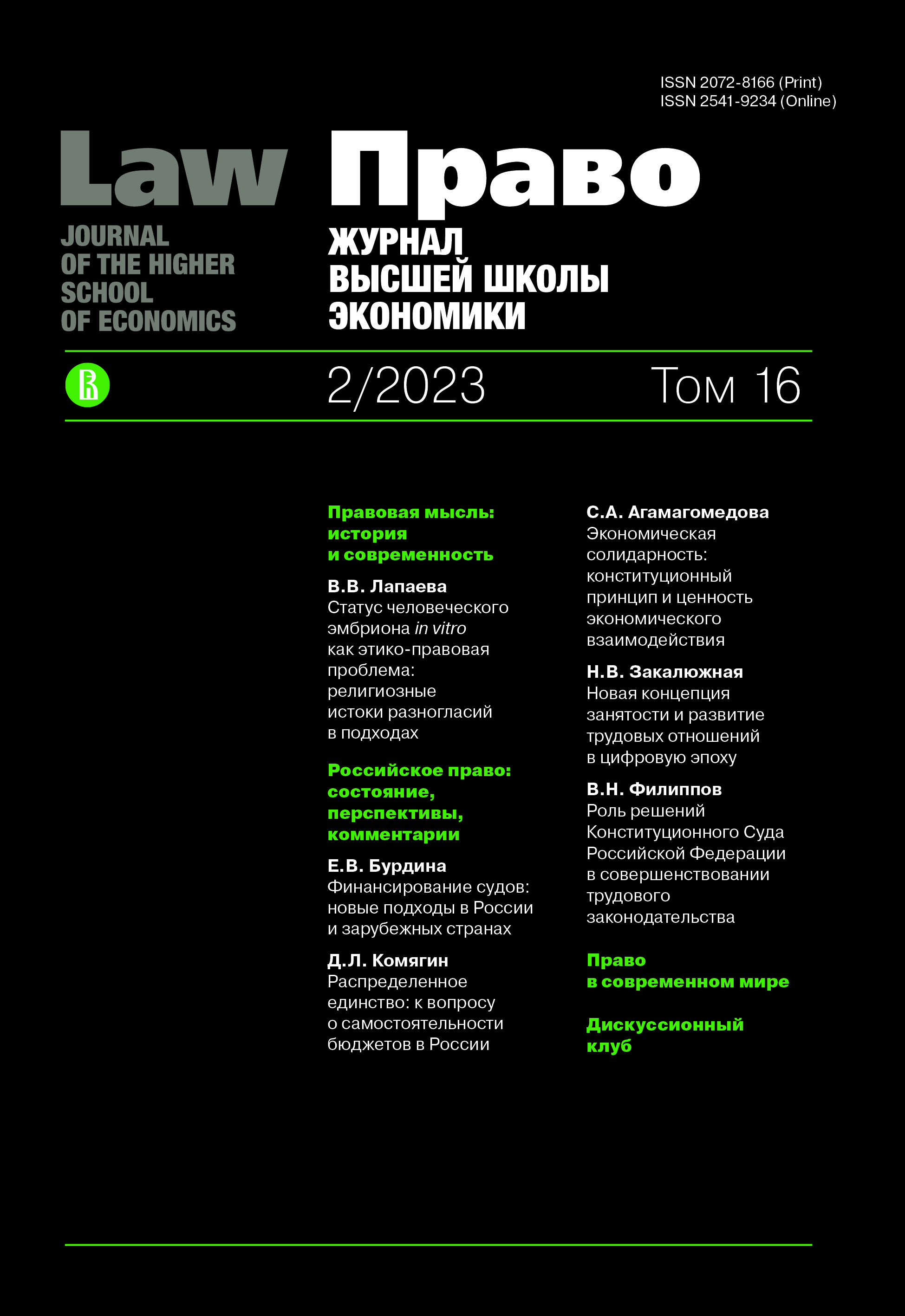Новая концепция занятости и развитие трудовых отношений в цифровую эпоху
Аннотация
В современных реалиях кардинально изменяются роль трудового права и заложенный в нем функционал. При этом формируются отношения, которые выстраиваются по определенным правилам, однако их правовое регулирование может отсутствовать (нетипичная занятость, в том числе привлеченный труд, гиг-занятость, самозанятость, спот-занятость и др.). Одновременно изменяется роль интеграционных объединений в сфере труда, транснациональных корпораций. Цифровизация в трудовом праве выходит на качественно новый уровень. В статье предлагаются актуальные направления исследования указанных отношений в рамках новых вызовов трудовому праву. В декабре 2022 года в Государственной Думе состоялось заседание рабочей группы по проекту нового федерального закона «О занятости населения в Российской Федерации». Проект был отправлен на переработку. Пока законопроект не стал законом, возможны его дополнительные изменения и уточнения, что делает предложенную тематику еще более актуальной. Важным вектором сегодняшнего дня является необходимость концепции нового типа занятости и дальнейшего совершенствования законодательства о занятости населения. Кроме того, роботизация в сфере трудовых отношений не только находит отражение в положительном использовании промышленных роботов, способных с успехом выполнять однотипные повторяющиеся задачи, но и таит в себе различные риски. Занятости населения также угрожает и возрастающее использование искусственного интеллекта. Цифровизация в сфере трудовых отношений логичным образом влечет нетипичные формы использования уже классических институтов; например, открываются новые возможности в применении института социального партнерства, а именно, в деятельности отраслевых профсоюзов в аспекте регулирования коллективных трудовых правоотношений. В исследовании проанализированы законодательные изменения, касающиеся электронного взаимодействия работника и работодателя в рамках дистанционной работы.Литература
Andreeva L. Yu., Dzhemaev O.T. (2017) The influence of digital economy on forming new trends in the Russian labor market. Gosudarstvennoe i munitchepalnoe upravlenie=State and Municipal Administration, no. 3, pp. 25-32 (in Russ.)
Belozerova K.I. (2022) The influence of digital technologies on labor function of an employee and other related terms of employment contract. Actualnie problemy rossyiskogo prava=Issues of Russian Law, no. 7, pp. 91-98 (in Russ.) DOI: https://doi.org/10.17803/1994-1471.2022.140.7.091-098
Dzhioev S.H. (2006) Legal issues of promoting employment. Moscow: Prospekt, 288 p. (in Russ.)
Deltsova N.V., Kot M.K. (2019) Legal aspects of the application of information technologies in the field of labor and employment. Vestnik Volzhskogo univesiteta imeni Tatischeva=Bulletin of V.N. Tatishchev Volga University, vol. 1, no. 2, pp. 106113 (in Russ.)
Eremin V.V. (2019) Robotization and employment: a deferred threat. Mir novoi economiki=World of the New Economy, no. 1, pp. 25-35 (in Russ) DOI: https://doi.org/10.26794/2220-6469-2019-13-1-25-35
Filipova I.A. (2020) Labor law: challenges of the information society. Pravo. Zhurnal Vysshey shkoly economiki=Law. Journal of the Higher School of Economics, no. 2, pp. 162-182 (in Russ.) DOI: https://doi.org/10.17323/2072-8166.2020.2.162.182
Khubulova M.I. (2022) Artificial intelligence in the sphere of labor. Trudovoe pravo v Rossii i za rubezhom=Labor Law in Russia and Abroad, no. 3, pp. 45-47 (in Russ.)
Kostoeva V. (2020) Better call Saul: will technology be able to replace a lawyer? Available at: URL: https://www.forbes.ru/brandvoice/ipquorum/391127-luchshe-zvonite-solu-smogut-li-tehnologii-zamenit-advokata.(accessed: 25.11.2022)
Kotova S.I. (2019) The legal position of the precariat in the labor market and the concept of employment. Candidate of Juridical Sciences Thesis. Moscow, 206 p. (in Russ.)
Labor Law of Russia (2005) S.P. Mavrin et al. (eds.). Saint Petersburg: University Press, 448 p. (in Russ.)
Lyutov N.L. (2018) Remote labor: experience of the European Union and legal regulation in Russia. Russkyi zakon=Lex Russica, no. 10, pp. 30-39 (in Russ.)
Savenko L.I. (1986) Individual labor activity: concept and scope of legal regulation. Sovetskoe gosudarstvo i pravo= Soviet State and Law, no. 4, pp. 42-47 (in Russ.)
Stepanov V. (2013) Remote workers: a new category of workers in Russian labor law. Trudovoe pravo=Labor Law, no. 6, pp. 9-12 (in Russ.)
Tishkovich K.S. (2021) Social dialogue in the conditions of the spread of atypical forms of employment. In: Protection of social and labor rights of workers in a changing world: opportunities and limitations. Conference papers. Yekaterinburg: UGYU, pp. 145-149 (in Russ.)
Vdovina T. (2021) Liberation from labor: The WEF described a positive scenario for the widespread introduction of artificial intelligence.
Copyright (c) 2023 Право. Журнал Высшей школы экономики

Это произведение доступно по лицензии Creative Commons «Attribution-ShareAlike» («Атрибуция — На тех же условиях») 4.0 Всемирная.


















